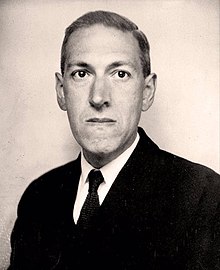
Back H.P. Lovecraft Afrikaans H. P. Lovecraft AN هوارد فيليبس لافكرافت Arabic هوارد فيليبس لافكرافت ARZ H. P. Lovecraft AST Hovard Fillips Lavkraft Azerbaijani اچ. پی. لاوکرفت AZB Говард Лавкрафт Bashkir Говард Філіпс Лаўкрафт Byelorussian Гаўард Філіпс Лаўкрафт BE-X-OLD
H. P. Lovecraft | |
|---|---|
 Lovecraft in 1934 | |
| Born | Howard Phillips Lovecraft August 20, 1890 Providence, Rhode Island, U.S. |
| Died | March 15, 1937 (aged 46) Providence, Rhode Island, U.S. |
| Resting place | Swan Point Cemetery, Providence 41°51′14″N 71°22′52″W / 41.854021°N 71.381068°W |
| Pen name |
|
| Occupation |
|
| Genre | Lovecraftian horror, dark fantasy, weird fiction, horror fiction, mythopoeia, science fiction, gothic fiction, fantasy |
| Literary movement | |
| Years active | 1917–1937 |
| Notable works | |
| Spouse | |
| Signature | |
Howard Phillips Lovecraft (US: /ˈlʌvkræft/, UK: /ˈlʌvkrɑːft/; August 20, 1890 – March 15, 1937) was an American writer of weird, science, fantasy, and horror fiction. He is best known for his creation of the Cthulhu Mythos.[a]
Born in Providence, Rhode Island, Lovecraft spent most of his life in New England. After his father's institutionalization in 1893, he lived affluently until his family's wealth dissipated after the death of his grandfather. Lovecraft then lived with his mother, in reduced financial security, until her institutionalization in 1919. He began to write essays for the United Amateur Press Association and in 1913 wrote a critical letter to a pulp magazine that ultimately led to his involvement in pulp fiction. He became active in the speculative fiction community and was published in several pulp magazines. Lovecraft moved to New York City, marrying Sonia Greene in 1924, and later became the center of a wider group of authors known as the "Lovecraft Circle". They introduced him to Weird Tales, which became his most prominent publisher. Lovecraft's time in New York took a toll on his mental state and financial conditions. He returned to Providence in 1926 and produced some of his most popular works, including The Call of Cthulhu, At the Mountains of Madness, The Shadow over Innsmouth, and The Shadow Out of Time. He remained active as a writer for 11 years until his death from intestinal cancer at the age of 46.
Lovecraft's literary corpus is rooted in cosmicism, which was simultaneously his personal philosophy and the main theme of his fiction. Cosmicism posits that humanity is an insignificant part of the cosmos and could be swept away at any moment. He incorporated fantasy and science fiction elements into his stories, representing the perceived fragility of anthropocentrism. This was tied to his ambivalent views on knowledge. His works were largely set in a fictionalized version of New England. Civilizational decline also plays a major role in his works, as he believed that the West was in decline during his lifetime. Lovecraft's early political views were conservative and traditionalist; additionally, he held a number of racist views for much of his adult life. Following the Great Depression, Lovecraft's political views became more socialist while still remaining elitist and aristocratic.
Throughout his adult life, Lovecraft was never able to support himself from his earnings as an author and editor. He was virtually unknown during his lifetime and was almost exclusively published in pulp magazines before his death. A scholarly revival of Lovecraft's work began in the 1970s, and he is now regarded as one of the most significant 20th-century authors of supernatural horror fiction. Many direct adaptations and spiritual successors followed. Works inspired by Lovecraft, adaptations or original works, began to form the basis of the Cthulhu Mythos, which utilizes Lovecraft's characters, setting, and themes.
- ^ Tierney 2001, p. 52; Joshi 2010b, p. 186; de Camp 1975, p. 270.
Cite error: There are <ref group=lower-alpha> tags or {{efn}} templates on this page, but the references will not show without a {{reflist|group=lower-alpha}} template or {{notelist}} template (see the help page).